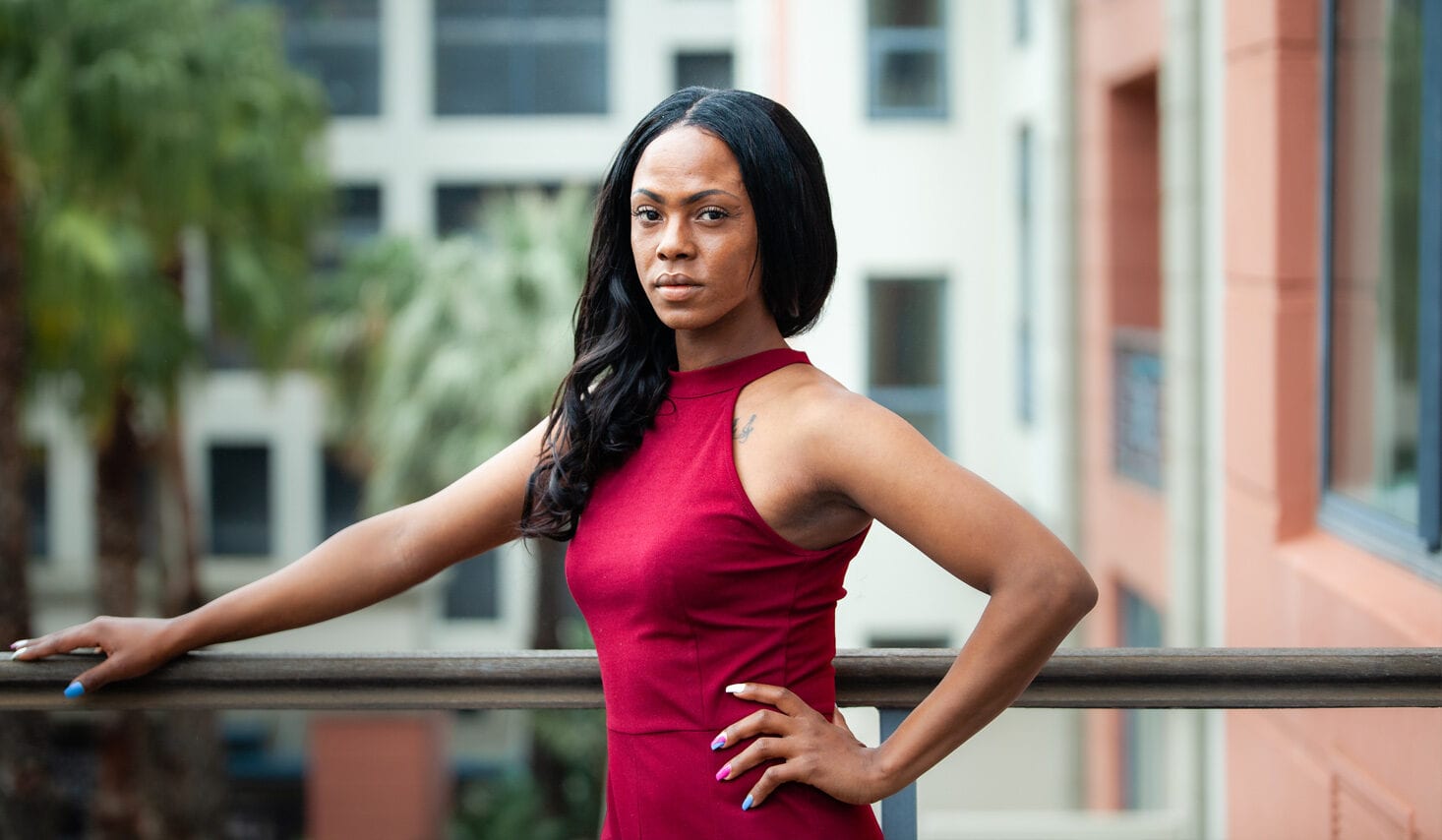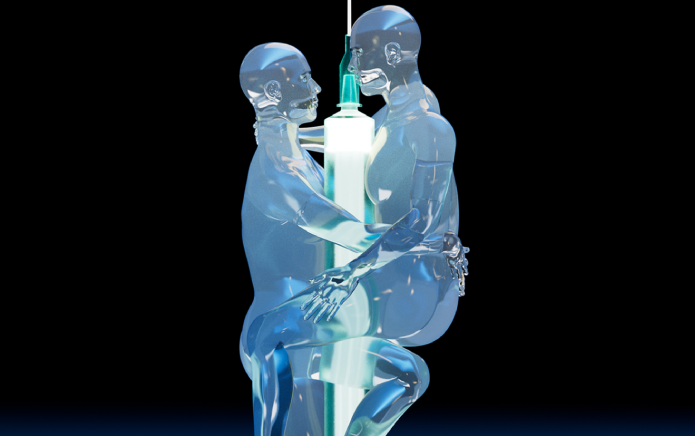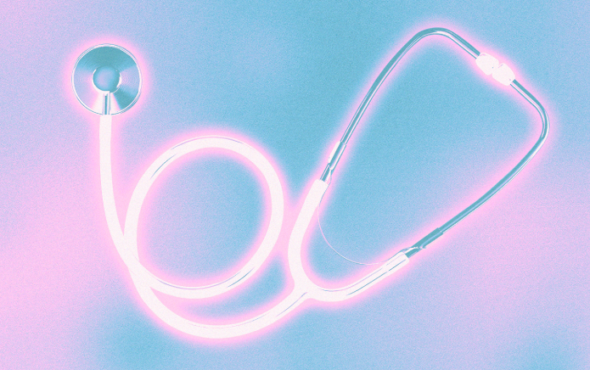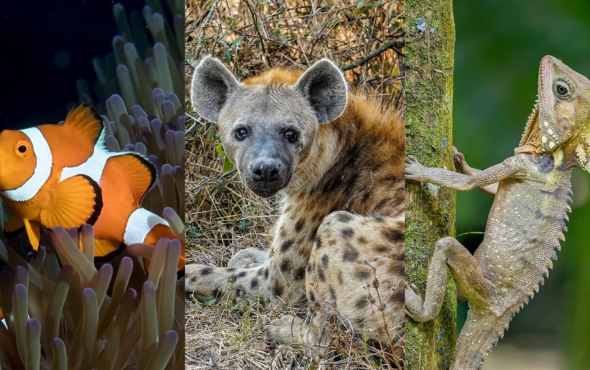
Since she was a child growing up in rural South Africa, Melody Seherrie has faced discrimination and bullying due to her gender identity and expression. In South Africa, the LGBTQ+ community regularly faces violence, stigmatisation and ostracisation – particularly in rural areas.
Now aged 30, Melody has turned her negative experiences into a positive force for good by becoming an activist – standing up for LGBTQ+ rights and, through her work with Gender Dynamix , making sure that existing laws and policies don’t further victimise or discriminate against trans and gender diverse communities and prevent them from accessing healthcare services. This work is all the more vital in South Africa, which has the biggest HIV epidemic in the world, with 7.7 million people living with HIV.
Here, Melody shares how she came out when she was 16, went on to win Miss Gay Northern Cape in 2013, moved to Cape Town and is now fighting and advocating for full acceptance of the LGBTQ+ community throughout South Africa. What makes her most proud is that she can love openly and walk down the street with her partner holding his hand as part of a thriving trans community – something that would not have been possible without the work she and her colleagues have been doing to stand up for LGBTQ+ rights.
MELODY’S STORY
Growing up in a very small town in the Northern Cape in South Africa was difficult. I always knew that something wasn’t quite right – that I didn’t belong in the body I was born in.
In my early school years, I felt that I was supposed to be a woman – I was supposed to have breasts and a vagina. I was bullied a lot in primary and high school by both males and females for the fact that I was different, that I was not as strong or muscular as a man “should” be. At home, it was just as difficult. My dad was very judgmental and discriminatory against me. I was kicked out of the house a few times.
By the age of 16, I met two of my friends who I still have today. They were openly gay and they were expressing themselves freely. We started this pact of living our true lives, our true identities. That’s when the whole transformation came about and I came out.
I opened up to my mother about it and she said she had already known since I was two years old. Then I spoke to my dad about it and he didn’t approve, not once. It bothered me for a long time, up until the point that I realised I didn’t need the world’s approval. You just have to be yourself, and those who appreciate that will find their way to you and life will become easier. And eventually it did.
I then entered a modelling competition, Miss Gay Northern Cape, and I won the title in 2013. After the competition, I decided to take another step into being me. I moved to Johannesburg – somewhere where I could be more open, more out there – more visible, seen and respected.
Eventually I moved to Cape Town to continue my studies as a social worker. But there it felt like the hardship cycle had continued, because the same thing that happened at school was happening again. People had no respect for gender identity. As a transgender person, being your true self was limited. My friends and I were physically assaulted a few times at the university.
In South Africa, the LGBTQ+ community is still segregated, ostracised, marginalised, assaulted, raped, discriminated against, criminalised, even murdered for being our true selves. This threatens our very existence. In the rural areas especially, we face a lot of discrimination. At school, for example, if you are born male, you can only wear boys’ trousers. You can’t grow your hair out and you have to use the male toilet facilities. People bear a lot of hatred in their hearts for members of the LGBTQ+ community. In the general community, people will call us names like “faggot” and “moffie” [Afrikaans]. They are withholding us from our rightful place in society.
When you’re searching for a job, cis gender people will get preference over the gay/trans/bisexual person, because employers don’t resonate with our lifestyle and our free expression of our gender identity or sexual orientation, and that’s sad. Especially during this pandemic, it has become worse because in rural areas, there are very few job opportunities. People are forced to do whatever they can do to get money. A few of my friends have sex with people for accommodation or to buy electricity.
Violence, stigmatisation and discrimination put people more at risk of HIV because this forces LGBTQ+ people underground, which compromises their access to healthcare and HIV medication.
At Gender Dynamix, we are addressing these issues at a community level through various programmes and community engagement projects, where we distribute HIV and AIDS care kits and safe sex guides and kits. We address not only HIV at the community level, but we also ensure that existing laws and policies don’t further victimise or discriminate against the LGBTQ+ community and prevent them from accessing healthcare services. We also visit clinics and healthcare facilities to provide training to healthcare providers.
My main drive to be an LGBTQ+ activist in South Africa is because of the past experiences I have had – even to get just a portion of the space that is occupied by cisgendered, heterosexual people. This motivation is not just for the generation now, but also for those on their way – to pave the way forward for them. Hopefully, my actions will inspire somebody else, a younger generation that will continue the fight. That’s what motivates me.
What makes me most proud is that we are thriving as trans communities. We are fighting and we are living our purpose of advocating for full acceptance. I’m proud of the fact that I can love openly, and I can walk down the street with my partner and hold his hand. Just being seen with him in public makes me proud. We plan on getting married sometime soon, hopefully later this year.
To me, Pride means free expression and unity. In the flag, there are various colours, but all the colours are on one flag – all united. It means you are able to freely embody whatever you feel like at that moment and just celebrate who you are. Pride carnivals feel alive, electric – the feeling of being you, and nothing else, just being your true self.
What I am most proud of, as an activist, is the fact that I have been able to connect members of my community on a provincial level to healthcare providers. My hometown is very religious and conservative. But I have had sit downs between religious leaders and members of the LGBTQ+ community to find common ground and to see how members of the LGBTQ+ community can still partake in organised religion. I think those are the greatest strides I have made thus far.
My hope for the future is that we find our space; that we are free to be ourselves. On a national level, I hope that there will be policies and laws for the LGBTQ+ community, that the criminalisation of LGBTQ+ people should come to an end. I just want peace for our community. We’ve been tormented all our lives; I think we deserve some peace now.
Frontline AIDS has been at the forefront of the world’s response to HIV and AIDS for 27 years, working with community groups in countries most affected by the global AIDS epidemic.



